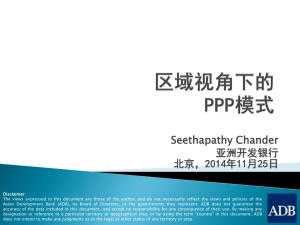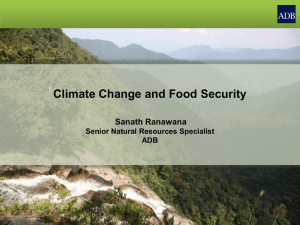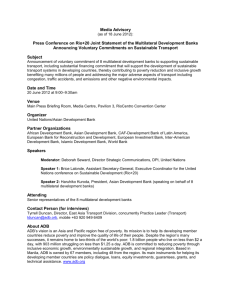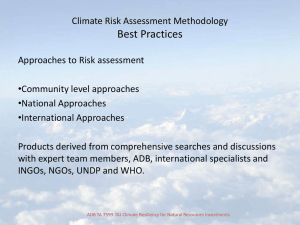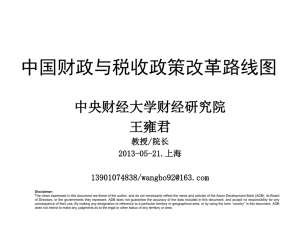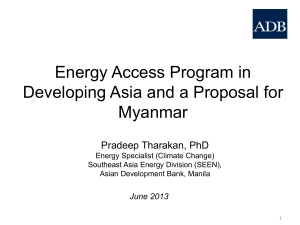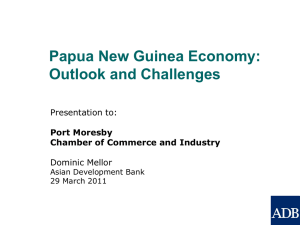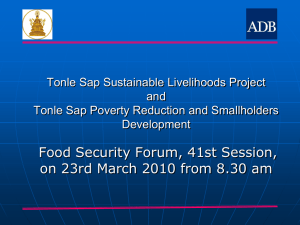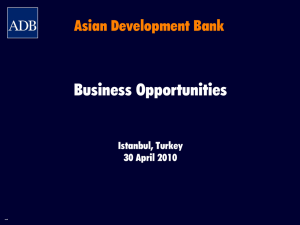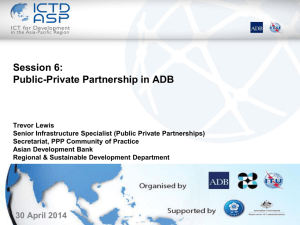ADB`s Role in Strengthening Environmental Governance and Rule
advertisement
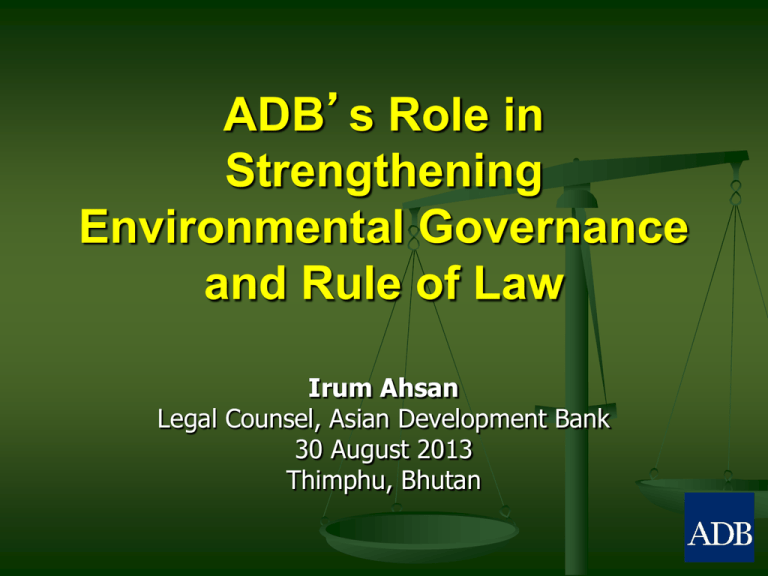
ADB’s Role in Strengthening Environmental Governance and Rule of Law Irum Ahsan Legal Counsel, Asian Development Bank 30 August 2013 Thimphu, Bhutan Outline I. II. III. ADB’s Operational Commitments towards Environmental Sustainability (ADB’s Safeguards Policy Statement 2009) ADB’s Role in Strengthening Environmental Justice (Law, Justice, and Development Program) 2nd South Asia Judicial Roundtable on Environmental Justice: Structure and Themes I. ADB’s Operational Commitments towards Environmental Sustainability (ADB’s Safeguards Policy Statement 2009) ADB’s Operational Commitments for Sustainability. (Environment and Good Governance) ADB’s Long-Term Strategic Framework (Strategy 2020) identifies good governance and capacity development as a driver for change, and environment (including climate change) as a core operational area. In this context, the goal of ADB’s Safeguards Policy Statement is to promote the sustainability of project outcomes by protecting the environment and people from projects’ potential adverse impacts. ADB’s Operational Commitments for Sustainability. (Environment and Good Governance) Environmental and social sustainability are cornerstones of economic growth and poverty reduction. ADB ensures the social and environmental sustainability of its projects. Safeguard Policy Statement 2009 ensures mitigation of environmental and resettlement impacts and impacts on indigenous peoples. Features of ADB Environmental Safeguards Policy Environmental Assessment Environmental Planning and Management Information Disclosure Consultation and Participation Grievance Redress Mechanism Monitoring and Reporting Features of ADB Environmental Safeguards Policy ADB will not finance projects that do not comply with its safeguards policy statement, nor will it finance projects that do not comply with the host country’s social and environmental laws and regulations. All loan documents and agreements for ADB projects incorporate observance of these safeguard policies. II. ADB’s Role in Strengthening Environmental Justice (Law, Justice, and Development Program) Law, Justice and Development Program The focus of ADB-OGC's Law, Justice and Development (LJD) program is legal development through strengthened policy, legal, judicial, and regulatory systems. Good governance and strengthened rule of law Consistent with strategic priorities, we are actively assisting our member countries, under LJD program, to strengthen their legal, regulatory, and enforcement capacities with regards to environmental considerations. LJD Work on Environmental Justice Considering the important role of Asian judiciaries, ADB prepared a technical assistance project for the establishment of Asian Judges’ Network on environment. Senior judiciary in Asia plays a key role in environmental enforcement: Direct: making environmental decisions, issuing rules and directions to lower courts, establishing green benches Indirect: leading the legal profession towards credible rule-of-law systems that promote environmental sustainability Judges influence the entire legal system, how legal and regulatory frameworks are interpreted and enforced which in turn affects private sector investment in related sectors ASIAN JUDGES NETWORK ON ENVIRONMENT ASEAN Chief Justices roundtable on environment South Asian Chief Justices roundtable on environment Brunei Darussalam Cambodia Bhutan Indonesia Bangladesh Laos PDR Malaysia Myanmar Philippines India Maldives Nepal Pakistan Singapore Thailand Viet Nam Sri Lanka III. 2nd South Asia Judicial Roundtable on Environmental Justice in Bhutan (Structure and Themes) Roundtable Structure Inaugural Session Two Plenary Sessions Regional Environmental Challenges Challenges for Effective Environmental Adjudication and Enforcement Consensus Building Discussion on the proposed SAARC MOU Finalization of Roundtable Statement Plenary Sessions on Regional Environmental Challenges DAY 1 Challenge 1: Climate Change Challenge 2: Challenge 3: Conservation of Natural Resources and Biodiversity Environment, Human Health, and its Economics Plenary Sessions on Challenges for Effective Environmental Adjudication and Enforcement DAY 2 Challenge 1: Challenge 2: Challenge 3: Challenge 4: Limitations of Environmental Policies and Laws Environmental Impact Assessment (EIA) Access to Environmental Justice and Alternative Dispute Resolution Mechanisms Capacity Constraints Consensus Building at the Roundtable Two Overarching Goals: 1. Identification of the role of the judiciary in shaping environmental law and building capacity to decide environmental cases (through Roundtable Statement ) 2. Identify the role and nature of South Asia judicial cooperation for strengthening cooperation in areas of mutual benefit, including ensuring continuity of involvement amongst the judiciary. (through MOU) Facilitators Kadin Chey la Tashi Delek Tel: (632) 632-4953 E-mail: iahsan@adb.org www.adb.org
